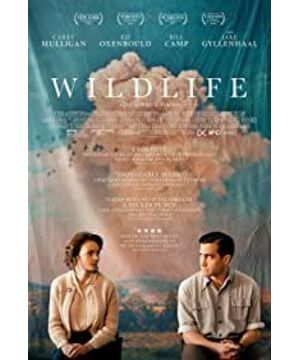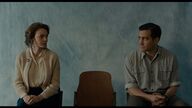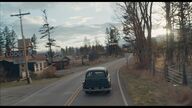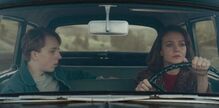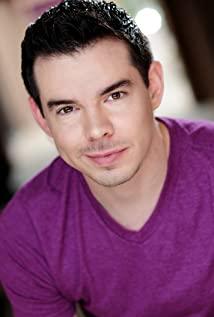In Hollywood film and television works, families often carry the core values of textual content. So we can see that no matter how powerful the characters are, they will try to create a warm harbor, the most vicious people are often out of revenge for their families, and the superheroes are often born and die in order to save their wives and children.
But interestingly, not many American films focus on the inner life of a family. Asian films tend to do better on this subject.
But at last year's Cannes Film Festival, Paul Dano's directorial debut "Wild Life" captured the subtle turmoil in a family with extremely restrained footage. Although it missed the Golden Camera Award, it still received a high score of 94% on Rotten Tomatoes and an MTC80 score.
It is quite surprising that this work, adapted from the novel of the same name, is wrapped in a value tendency that subverts tradition - the disintegration of a family.
Although the film does not emphasize the background of the times, no matter the furnishings of the interior furniture or the packaging of the canned food in the store, it reminds the audience of the film's intention to restore the historical background. And the advertising on the late-night TV subtly links the plot of the film with the background information - an advertisement for firefighters is accompanied by the slogan that "destroying forest fires is like fighting a war".
The broadcast as the background sound also revealed to us several times that 1960 was the background of the film, and the United States at this time was in the "Cold War" period.
1. The Wild Life of the Times
After the Industrial Revolution, there has been a "great diversion" of economic development levels around the world. The specific manifestation is that while the economies of developed countries such as Europe and the United States are advancing by leaps and bounds, the economies of some regions such as Africa are still lagging behind.
Within the United States, although the economic downturn in the "Great Depression" was improved during World War II, the rapid rise in the overall economy was accompanied by a "great diversion" of certain regions or individuals at the economic level.
Just like the family in the film, they appear to be decent middle-class people, but they are constantly moving around in search of a satisfying job. Therefore, when the only financial support of the family breaks, the originally stable family relationship begins to collapse.
Although the film starts from the point of view of son Joe, the most prominent of the three is the mother Janet, played by Carey Mulligan. From mental infidelity to physical infidelity, the video does not directly throw the results to the audience, but amplifies Janet's inner contradictions and anxiety one by one.
So, we see her lost expression when teaching swimming, muttering to herself when she parked her car next to a wealthy businessman, and the guilt that she didn't dare to look her husband in the eye when she confessed everything...
In this woman you can see a paradoxical psychological conflict, as in the United States from 1953 to 1960, trying to find a balance between anti-colonial and colonial forces, between decolonial principles and the Cold War, to take the "middle way" policy. And the course of the compromise that resulted from the internal policy debate of the State Council gradually became conservative, also revealed the hypocrisy of the United States in "supporting national self-determination" and the inherent contradiction between idealism and realism.
And the hypocrisy and contradictions at the national level are also directly revealed in the process of this family's fragmentation.
In addition to the correspondence between the family situation and the state of the country, the female consciousness represented by the female character is also logically self-consistent in the development of the plot and the realistic background, which still benefits from the charm of the character arc of Janet.
The development of capitalism has determined the system standard for people to reflect value in society. Economic income reflects the capitalist society's materialistic view of money. The statute of a male-dominated society - only allowing men to participate in foreign affairs - is nothing more than an indirect concealment. women's desire for social status.
Although the father Jerry played by Jake Gyllenhaal in the film does not have the dignified temperament in the stereotype, when Janet offered to work temporarily to supplement the family, she still decisively rejected the idea. Then Janet took the initiative to look for a job, which even more showed the resistance of feminism to the patriarchal statute.
And this bold act of breaking free from the traditional family concept not only satisfies Janet's need for financial independence, but is undoubtedly the budding of Janet's awareness of rethinking family relationships and life choices.
2. The wild life of the family
Even putting aside the metaphor of the times, Dano's handling of this unremarkable family story is still commendable. He skillfully avoided the entanglement of bitter and bitter characters, and buried the fuse of family disputes in a relaxed and moderate rhythm.
The film begins with the laughter of the father and son playing football, and then records their playful process with a fixed panoramic lens. When the two run from the foreground to the background until they "leave the camera", the title It appeared quietly, and after the title disappeared, let the two run back to the foreground. With the quiet, soothing and somewhat desolate piano sound, it immediately created a sense of passage of time and established the tone of the whole film.
Subsequently, the film explained the quiet and peaceful life of the family and the school or work life of the three in a few simple clips.
After just giving two shots showing the family's happiness, it led to Joe's fire knowledge class at school. The lines in this plot can be said to be the key to deconstructing the entire film: First, it refers to the benefits of fire – it can promote the regeneration of trees, just like the divorced mother at the end of the film to pursue an independent life; Second, it refers to the fire. Uncontrollable - once it starts, it is difficult to control, just like this family split, which was doomed as early as when Janet rethought her current life; the third is to mention the danger of fire - compared with wildfires, the real What harms people is the thick smoke blown by the strong wind, just like in Qiao's eyes, the most cruel thing to him is not the fact of his mother's derailment, but the lack of his father's company and the loss of family warmth.
The lines of the classmates next to it are more direct - this is equivalent to directly implying that although the wild life of this family will be shown from Joe's perspective, it will be powerless to restore the overall situation.
It is easy to notice that Director Dano mainly used fixed shots in the first act, with occasional small movements, mostly to meet the shooting needs of character framing and composition. In addition, almost all the selection of objective lens and horizontal photography angle, coupled with the moderate sense of distance generated by the medium shot, also makes the happiness of the whole family seem extremely calm.
Until her mother, Janet, was looking for a job on the street for the first time, the film highlighted the turning point of the plot with an overhead shot, and made Janet turn her back to the audience while trying to show the characters "out of the frame".
The atmosphere of the film also began to change after Janet found a job as a swimming coach, first comparing her mother Janet's excitement to finding a job with her father Jerry's silent decadence, and then using a normal bedroom quarrel between an ordinary husband and wife to emphasize Jay. Rui is anxious about being unemployed.
I really liked the next parallel montage. The film makes parallel editing of Joe's application process in the photo studio, his mother Janet's work scene, and his father Jerry's hesitation about participating in firefighting work. It clearly shows us the lifestyle and emotional state of the three individuals, and conveys to the audience the sense of separation of a complete family.
In this clip, the three people are in the same frame only once, and it is very incomplete – the father is meditating outside the house, the mother is washing dishes in the kitchen, and the son is doing homework in the house (the screen is covered). The emotional rupture within this family is a self-evident fact.
The plot after that happened very tight. The father, determined to be a firefighter, is about to leave the house for a while, igniting one of the most heated arguments in the film. Janet couldn't stand the man's behavior of "abandoning his wife and children", and her husband's waywardness and excessive self-esteem for a long time made Janet angry at the poor quality of her married life.
The shot of the three people in the same frame is very shocking. It is not only the climax of the dramatic conflict, but also reflects the sense of power. The back of his son Joe is used as the foreground, leaving the depth of field to the quarreling parents, reflecting Joe's helplessness. And Joe's gradual retreat in front of the camera also reflects his inner resistance to this intense family relationship. What's even more terrifying is the strong atmosphere of the separation of the two parents in the camera. If you find that this is the only time in the film, except for the first two minutes, for an hour and a half, the three people are in the same frame.
Once again, seeing the three people in the same frame is when all the disputes have settled, and this shot echoing the front calmly announces the complete end of this family relationship.
In order to fit the overall bland style of the film, Director Dano did not play too many tricks in the selection of shots, but the accuracy of shot selection was not as proficient as a novice. In addition to the shots mentioned above, the three subjective shots that seem out of place throughout the film also bring a strong contrast.
The first time happened on the night when his father lost his job. What Joe "peeped" was that his mother was trying his best to comfort and encourage his father to cheer up; the second time happened on the night of attending a rich businessman's dinner, when he was about to leave, The mother returned to the house to return the coat. What Qiao peeped was that the mother was kissing the cheating object; the third time happened one night when winter came, and what Qiao peeped was the rich businessman entering and leaving the mother's bedroom and the two leaving. .
Similar to this seemingly unremarkable, but actually full of characters' psychological or emotional scenes are everywhere in the film, they are all accomplishing the same thing - to hide the waves of the family in the calm and soothing narrative. Changes in the entire family relationship naturally create a rift leading to disintegration.
In the process of watching the movie, I kept thinking, where is the "wildness" in the title of the movie? There is neither dynamic and boiling background music, nor the ups and downs of life with great joy and sorrow, and even the occasional hoarseness is just the most common way of quarrel between husband and wife. But when Jerry said, "This life is really wild", I suddenly realized that the so-called "wildness" is a kind of sadness revealed from the bones.
The root cause of the breakdown of the whole family relationship is not Janet's derailment, but her exhaustion of relying on her husband to travel around, reflection on her personal life, and re-examination of her personal emotions.
For Janet, the once-stable job benefits were gone overnight, and the job she tried so hard to find was just barely enough, and the marriage life, which should have been the most powerful spiritual support, was gradually exhausted by the trivialities of life. When both career and love are incomplete, is the derailment against morality safe?
For Jerry, his self-esteem as a man is worthless in the face of an increasingly cruel life. The career that he has risked his life has created a vacancy in his family relationship. Only got a falling apart ending. When life has gradually swallowed up the arrogance and stubbornness of the past, is the turmoil under the devastation more shocking than breaking into the fire?
For Joe, the life without the company of his father is bleak, the communication gap between him and his mother is increasing, and he can only accept the reality as he watches the relationship between his parents break down. When the rebellious emotions of adolescence cannot even be dredged normally, and they are forced to accept the vicissitudes of life they have seen, can they use the word "growth" to prevaricate and cover up their inner grief?
When life itself has become a wild horse, who can resist the impact of "wild life"?
In my eyes, the ending part of the film is more like a sideshow. When the winter was gone, and the sun was shining brightly in Montana, Joe's eyes were full of smiles when he learned that his mother, who had moved to Oregon, was returning to the cottage. Although he knew in his heart that the family reunion would only last for one weekend.
Dano gave a lot of warmth in the last five minutes, not only did he not hesitate to give many shots of three people in the same frame, but also let the unfamiliar feelings between the husband and wife give way to the warm interaction between the three, although you still Can capture the embarrassment and consternation between two adults.
And the son, who has been working as a part-time photographer, finally took a family photo of the three-member family that was only maintained on the surface. Although every audience knows well, this freeze-frame photo records the closely connected emotions of the three The connection is also the fragmented mottled beauty.
The ending scene of the movie is really hard to guess. In the countdown to son Joe, the family of three in front of the camera struggles to maintain the happiness that a family should exude. At the moment when the countdown ended, the title "wildlife" quietly appeared in the background of the black screen, and I was already in tears.
[references]
[1] Ding Zhiming. Research on "Poverty" in American Society (1890-1960) [D]. Hebei University, 2016.
[2] Bi Yuanhui. "The Middle Way" and Its Predicament: An Analysis of the "Decolonization" Policy of the United States from 1945 to 1960 [J]. Journal of Inner Mongolia University for Nationalities (Social Science Edition), 2015, 41(02): 25-29 .
[3] Wang Chunxia. Related research on the employment changes of American women after World War II (after World War II to the 1980s) [D]. Northeast Normal University, 2013.
Author | Years of the past; public account | Watching movies and seeing death
Editor | Teenager on the Roof; Please indicate the source for reprinting
View more about Wildlife reviews


